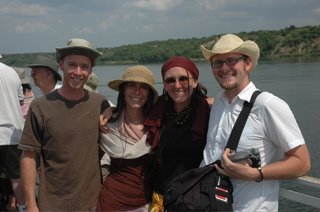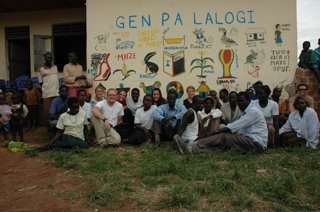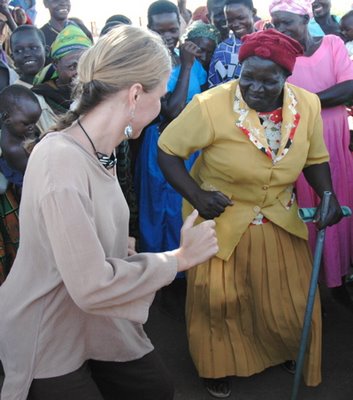
“We hold these truths to be self evident, that all men are created equal, that they are endowed by their Creator with certain inalienable rights, that among these are life, liberty and the pursuit of happiness. That to secure these rights, governments are instituted among men, deriving their just powers from from the consent of the governed…”
This year, we celebrated the declaration of these words, by singing the National Anthem in harmony with Kimbal and Kellen in a swimming pool overlooking the Nile River in Murchison Falls National Park, Uganda. We raised our plastic glasses high, and toasted the independence we enjoy. It was the second official Porter / Kurtz family vacation, and if the first two are telling of those to come, they will be full of good conversation, therapeutic laughter, spiritual inspiration through nature's beauty, and wild animals.
After two weeks with TNL we took our first vacation. We stayed three days in the most luxurious and exotic place I’ve been in Uganda. Five hours after leaving Lira we pulled up in a rented beaten up old car that spewed lung-fulls of dust and exhaust into our faces at every bump—I was almost embarrassed. Then the doorman literally jumped toward us with a huge smile and greeted us with, “Welcome to paradise!” This was followed by cold washcloths for the dust and passion fruit for our dry throats--served on a silver tray. Then we were led to rooms with a classic safari flair with draping old fashioned mosquito nets and a sliding door that led to a patio two steps away from the pool with a swim up bar. Beyond that the Nile ran through a valley of exotic trees, flowers and grasses inhabited by the wildlife we were yet to see (lion, wildebeast, elephants, varieties of monkeys, hippoes, crocodiles, giraffes, kob, etc).

I could barely breathe it was so beautiful--and felt so far—so distant from the community I work with every day, not only the community, but even my colleagues. This place was of another world—out of reach by real Ugandan life and people, a gated protected phenomenon reserved…for who? We saw few African guests—and fewer Ugandans. It was full of short-term missionaries. Having been one of them on more than one occasion myself I had mixed feelings, but somewhat guiltily, I admit I cringed when I overheard most pool-side conversations and had to bite back stinging words and judgmental statements. Kellen, equally sensitive, reminded us that it is just ignorance and not malice. Likely, they had good intentions and good hearts. There is really only so much you can learn in a short time in a country and we all come with our own cultural lenses and assumptions. Ignorance is not so irksome as long as it is accompanied with humility. It’s when ignorance shows up for two weeks to teach the rest of the world the “right” way to do things that my blood starts boiling. (I heard one gray haired Southern Belle tell a Ugandan woman in a thick drawl, “We came over hiyar to teach y’all how to be leaders. Because if we don’t y’all do’ know haow.”)
I have a growing feeling of frustration and quiet outrage over the social assumptions made about black and white.
Besides the clientele, there was something else on our vacation that sparked this tension: the art. It fed a complex of inferiority/superiority. The art fit the overall ambience reminiscent of the early European Explorers on the African continent and depicted much historical drama surrounding the exploration of Murchison Falls, named after the President of the Geographical Society. Before Europeans, the name was derived from the evil spirits believed to be manifest in the Tse tse flies (which are vicious little biters, it’s no wonder they are thought malevolent). There were a series of ink drawings depicting white explorers, usually being hailed or served by scantily clad African men and sometimes shown observing while the Africans in their employment were paid to kill other Africans. One such picture had a caption underneath that referred to the men being killed as, “forest dwarfs.”
This is history. It shouldn’t be hidden. But this display glorified the racist treatment of Africans. Wouldn’t it be more appropriate for such drawings to be accompanied with something acknowledging guilt or a memorial to the victims of the European Explorers ambitions—not framed on the walls of a lodge to make the latest waive of European (and American) Explorers think it is quaint to animalize the African people? In what ways did I participate in the continued exploitation between white and black by silently observing the art, enjoying the ambience, and not even voicing my discomfort to the management? It fed what I believe is a proper response of white woman’s guilt.
In Uganda, issues of race do not feature quite so prominently as they do in many places—even the U.S., in Denver, and in neighboring Kenya—the social divisions and assumptions of unequal power relationships are more on the forefront of social consciousness. It is more sensitive, or our radar is more in tune. In contrast, in Uganda it feels like most people assume the best intentions about their white American and European friends. I have never felt that my words or actions were being scrutinized to detect racism. But the divisions do surface, and I am taken off guard and surprised when they do—however small and seemingly insignificant. Recently, I had a conversation with a friend who asked why I don’t dress in African wear and braid my hair. The simple answer is that I haven’t bought new clothes and my scalp is painfully white—I’m a white girl who can’t pull off the look very well. But my friend didn’t get it—if it’s good enough for African women why not for me? So I braided my hair and my Ugandan friends think it is wonderful. Kellen and I did it together. It took twelve hours.
When we picked up the TNL crew, a friend came to the airport with us. We owed him some money for putting gas in the car, so while we were waiting Ben pulled out some cash to pay him back. He got uncomfortable and said no, give it to me later, not here. Neither of us understood why and we thought it was a little strange. He explained that people would think he was doing a service for us. At the time, I was thinking, who cares what some random people in the airport think. But I missed it. I assume it is evident that he is my friend, my peer and my equal. That is what he wants people to see when we spend time with him. At that moment he was keenly aware of what had not crossed my mind—when we are out together people assume he must be working for me.
“We hold these truths to be self evident, that all men are created equal…” is it so evident? Equality and justice between people requires intentional action, it has to be explained, looked for, fought for. What are evident are relationships characterized by unequal power, choice and access. Governments are instituted to secure our rights but we choose whether to passively acquiesce to their unequal application or to participate in making things right. A friend emailed me recently and suggested that justice and hope were intricately intertwined. Maybe that is because we can’t work for justice without a vision of what it is and some sense that it is possible and we have a role to play. Despite trying to orient my occupation to the end of justice, on a daily basis I struggle to find ways to do justice and avoid perpetuating injustice.


